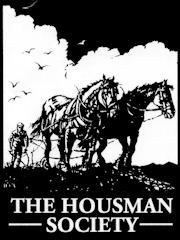A Shropshire Lad
|
|||||||||||||||||||||||||||||||||||||||||||||||||||||||||||||||||||||||||||||||||||||||||||||||||||||||||||||||||||||||||||||||||||||||||||||||||||||||||||||||||||||||||||||||||||
Key: V: Textual Variation. C: Commentary. Q: Question. Glossary
ASL VII “When smoke stood up from Ludlow”
Top ▲ Glossary
| Line | Word | Glossary |
| 3 | blithe | 1. Happy, cheerful, and carefree
2. Casually indifferent |
| 6 | coppice | An area of densely growing small trees, especially one in which the trees are regularly cut back to encourage more growth. |
| 8 | hearkened | Listened |
| 11 | yeoman | 1. A member of a former class of English commoners who owned and cultivated their own land 2. A loyal, reliable, or diligent worker |
| 22 | strain | 1. Song Consider: “2. Mental or physical stress caused by an intense or extreme pressure or demand” |
Top ▲ Commentary
| Line | Commentary |
| Date: 10 Aug – 30 Sept, 1895 | |
| 1 | The market town of Ludlow, in South Shropshire, provides an important focus for the life of the surrounding rural area. Compare “The lads in their hundreds to Ludlow come in for the fair” (ASL XXIII – not in exam selection) |
| 2 | The River Teme rises south of Newtown in Powys, flows east and south-east through Shropshire and the town of Ludlow before joining the River Severn just to the south of Worcester |
| 5 | “team” refers to the team of shire horses which pull the plough – horses provided the motive power for agriculture well into the twentieth century. Compare “Is my team ploughing” (ASL XXVII) and the general associations of comradeship with his fellows, human and otherwise |
| Meter | Five-line stanzas of alternately rhyming lines of seven then six syllables in an iambic metre: this is a common form in Housman. The two-syllable rhyme word in the odd numbered lines has an unstressed final syllable, known as a “feminine” ending. In this poem a fifth and additional line is added, rhymed as a couplet with the preceding line. |
Top ▲ Variations
| Line | Text | Textual variation |
| 1 | d1 | As down the lanes to ploughing |
| 1 | d2 | As blithe afield to labour |
| 2 | d1 | I strode beside the team → Against the morning beam |
| 2 | d2 | Through dewy lanes astream → Against the morning beam |
| 3 | d2 | I strode beside the \ my / waggon |
| 4 | d2 | Against the morning beam → Through dewy lanes astream |
| 5 | d1 | Against the morning beam → And whistled to the team |
| 5 | d2 | And whistled to the team |
| 6 | in] from | |
| 8 | And perched \<flew>/ to hear me whistle → And <when he heard me whistle> \ hearkened as I whistled / | |
| 9 | trampling] jingling | |
| 10 | fluted] whistled | |
| 12 | use to rise and] ails a man to | |
| 13 | <Rise he a thousand mornings> \ Rise man a thousand mornings / → He’ll rise a thousand mornings | |
| 14 | <At evening down he lies> \ Yet down at last he lies / → But down at last \ eve / he lies | |
| 16 | <So the blackbird fluted> → I heard the tune he <fluted> \ sang me / | |
| 17 | And spied] Along | |
| 18 | I spied \ picked / a stone and cast it \ swung it / | |
| 19 | threw] flung / sent | |
| 21 | Then my soul within me → In my heart the echo | |
| 22 | Kept up the echo long → took up the blackbird’s strain | |
| 23 | the] my | |
| 24 | It sang the blackbird’s song → Along the <dewy> \ steamy / lane | |
| 25 | The dewy lanes along → It sang the <song> \ tune / again | |
| 28 | Who drives afield to labour → And men \ The men / that rise to labour | |
| 29 | lead one home] aye \ yet / come home aye lie down |
Top ▲ Questions
| Line | Question |
| 1 – 5 | Consider the following alternatives to the beginning of the first stanza, which can be reconstructed from the drafts:
Why do you think the poet decided upon the final version? |
| 4 | The line “Against the morning beam” appears over and over in the drafts of the poem – why do you think it is such an important line to the poet? |
| 5 | Is there a deliberate ambiguity in the two words “Teme” and “team” – are we meant to wonder whether he is beside the river? |
| 9 | What effect does the replacement of “jingling” from the earlier draft with “trampling” in the final version have on the tone of the poem at this point? |
| 18 -20 | Why does the narrator, so carefree at the beginning, react so violently towards the blackbird and its song? |
| 26 -30 | Why does the narrator’s soul take up and accept the blackbird’s message at the end of the poem? |
| Whole Poem | What is the effect of the fifth line in each stanza? Does it give a sense of completion, one of qualification of the previous idea or another effect? |
